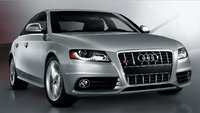Audi "recommends" using 91 octane gas but "requires" using no less than 87 octane. Will using 87 octane on a regular basis harm my vehicle?
Asked by Peter May 24, 2013 at 09:24 AM about the 2013 Audi S4 3.0T quattro Premium Plus Sedan AWD
Question type: General
Audi "recommends" using 91 octane gas but "requires" using no less than 87 octane. Will using 87 octane on a regular basis harm my vehicle? From what I understand, today's hi-tech cars are designed to compensate or automatically adjust to lower octane unleaded gas so as to avoid "knocking" or "pinging". Is it just a waste of money to pay for "premium" octane gas?
23 Answers
What year is your Audi? - Audi recommends the higher octane for two reasons: It is refined cleaner, which means it does not gum up the lines, and burns cleaner in the engine allowing longer periods between oil changes, and the second is performance. Higher Octane means more energy in each combustion cycle. You may not notice a difference, but the engine will run more effeciently on a higher octane. Plus, when you break it down, if you put 10 gallons a fuel in, you're paying just a $1.00 more per fill up. This trouble is much better than dealing with a clogged fuel pump. I say suck it up and eat the $1.00 per fill-up and enjoy the greatness that is Audi.
The specs on some cars says premium (suggested). Looking at the specs on yours it states premium (required). I would only use the premium in your car. After looking at the specs on your car I just might have to go take one for a ride. 3 L V6 Supercharger AWD. Bet that's fun to drive.
Buy the premium fuel. It delivers better performance and fuel economy for a few cents more per gallon. The S4 is a beautiful car with a high tech engine. Treat it right. --- See what other owners are saying on Audiworld.com and Audizine.com
The comment that higher octane means more energy in each combustion cycle is a common misperception. Octane has nothing to do with the energy contained in a said amount of fuel. The octane rating is a way of rating the fuels resistance to premature detonation or what is better known as "knock". The reason for the higher octane requirement is so that the engine can obtain it's maximum performance as designed. Most engines today have "knock" sensors which detect lower octane rated fuel and decrease engine timing to compensate. Reduction in engine timing normally results in slightly lower engine output and a reduction in gas mileage.
All other factors remaining equal, using a higher octane fuel should result in better gas mileage, but not necessarily better "performance".
tennisshoes...I appreciate your response. So just to be clear, you're saying that I can safely use regular (87 octane) in my S4 without fear of any damage to the engine...even though Audi "recommends" premium. Practically speaking, what is the "downside" to using regular over premium? Or conversely, what "advantage" is there to using premium over regular? Is it performance, fuel economy or what???
Premium gas vs. regular: What's really better for your car? https://www.youtube.com/watch?v=FPPkPAbzwbU Should I use hi octane premium petrol, and what is octane rating? https://www.youtube.com/watch?v=WYlk9C1o0nk
Firstly, there is a .40 / gal premium in S AZ for premium fuel, so about $5/ tank. I had an Acura in Oregon that “required” premium fuel but I usually used the 89 octane fuel or alternated between 87and 89 octane. Rarely used 91 octane. Car ran perfectly for 100,000 miles or so before I sold it.
And lets not get into the difference between RON, MON and PON - (Research Octane Number, Manufacturers' Octane Number and Pump Octane Number....).
Notmuchexpertise answered 6 years ago
A friend recommended, and I recalled reading something about Exxon regular (87) gasoline having extra properties so that cars requiring premium could use Exxon regular. My A4 was making a knocking noise (not due to any maintenance need), so I first used Exxon premium to eliminate knocking, but have since used 2 tanks of Exxon regular and the knocking came back. Do I need to switch back to premium, and does it matter if I go to a different station (Chevron-more convenient)? What do y'all think?
Audi_Machine2008 answered 6 years ago
I don't know where you guys are buying 93 Octane gas for a few cents more than 87 Octane but in Chicago its $1.00 some times $1.10 difference per gallon, My Q7 has a 26 gallon gas tank so that $26.00 to $28.60 difference a full tank from 87 Octane. At 13 miles per gallon that's a Big difference. Opinions please, what you guys think about using 87 Octane gas and adding required amount Lucas fuel treatment per full up instead of using 93 Octane?
Try 91 Octane if it is cheaper. 91 is all you can get in a lot of states so your Beemer should run just fine on it. If you could make high octane gas with a cheap gas additive 93 octane would be cheaper don't you think?
Notmuch, You need premium all the time, not once or twice.
The higher the octane number, the more compression the fuel can withstand before detonating (igniting). In broad terms, fuels with a higher octane rating are used in high performance gasoline engines that require higher compression ratios. "Performance" engines have higher compression ratios, so the point is for the fuel to be more compressed (higher temp, more bang) before it ignites. High octane means lower fkash point. Using a lower octane rating may allow the fuel to combust before the compression is complete..... However....there is NO BENEFIT to using high octane fuel in an engine that wasn't designed for it.
Cdn_Songbird answered 5 years ago
My brother is a race-car engineer who builds and helps his teams run high performance cars for a living. He said that premiums fuels are not necessary, that manufacturers use high octane when making claims of your miles/gallon and horsepower so they recommend it. But the MPG and HP improvement is 1 to 2% versus baseline. He said it is much more important to buy brand name fuel (vs Costco or similar) as it contains fuel additives and cleaners so carbon does not build up over time in the engine. Given premium is more than 20% more expensive in Canada vs regular, it is crazy to pay so much for 91 octane to get so little.
Does anybody know if I can stop using premium in my 16 year old Audi?? 03 a6. The mpg really seems to be suffering, making the purchase if premium way more expensive than it should be. Thx.
I recently bought a 2015 Audi A5 and did not give it any thought as to what fuel to use so I have been using 87 octane. I started reading on type of fuel use because I can hear the knock when I driving and I accelerate faster than usual. As well my fuel mileage is bad. That is what got me thinking that I may be using the wrong fuel. I will now try premium fuel and see what results I get Thanks for the valuable info here
I've just recently filled half a tank of 87 Oct in my 3.0 Audi, on top of the premium fuel, and noticed an increase in performance and launching! Not sure on the economy ,but right now I don't care. Enjoying the muscle response right now!
Car manufacturers have been pressured by the government to improve mpg. If they can prove a car gets better mpg using premium vs regular, that is going to be the gas they recommend so that they can appease the govt, and so they can attract more energy conscious consumers. I also have to wonder how much the oil company lobbyists have to do with premium "requirements". According to a few articles related to premium vs regular that I have read on the internet, a lot suggest there is no real benefit to using premium, you are just throwing your money away. They say there is no real horsepower boost that would be noticeable, and gas mileage is also not drastically increased. They also say that there are already plenty of detergents in regular gas that would limit the amount of carbon buildup within the engine. To me, judging by most "regular people" comments, it seems as most people are brainwashed into believing anything the manufacturer will tell you, and you can't think for yourselves or you cant do more research to figure out the real truth. Kind of like how a lot of people are brainwashed into believing oil has to be changed every 3k miles. I did a simple math equation to try to figure this out. 16 gallons (avg tank size) x $3.55 (regular) = $56.80 per fillup 16 gallons x $3.95 (premium) = $63.20 per fillup You pay $6.40 more to fill with premium so lets say you get 25 mpg using regular and 27 mpg using premium 16 gallons x 25 mpg = 400 mile range 16 gallons x 27 mpg = 432 mile range so by paying $6.40 more per fillup, you get an additional 32 mile range $6.40 divided by 32 miles = 20 cents per mile cost (regular) $56.80 (for 16 gal) divided by 400 (mile range) = 14.2 cents per mile (premium) $63.20 divided by 432 = 14.6 cents per mile you pay an additional 0.4 cents per mile by using premium (IF you indeed get 2 mpg extra) (reg) 25000 miles per year x 14.2 cents divided by 100 (to convert to dollars) = $3550 per year fuel cost (prem) 25000 x 14.6 divided by 100 = $3650 per yr so if you supposedly do get 2 mpg improvement, you pay $100 extra per yr if driving 25k miles per year. Not such a huge additional cost at all. It is more than worth it to pay an extra $100 per year to have the peace of mind using the correct gas for your car that will extend it's life and not cause damage - but again, this is only if you want to believe the car manufacturers and oil companies have your best interests in mind, or if they are more interested in padding their own pockets. I do not own an Audi, but I am seriously considering one, this is why I am here researching premium vs regular myths and legends.
Guru9XGJFK answered 3 years ago
I have no evidence to show premium gas vs regular has mileage improvement or damage or difference. I owns 2009 A6 and 2007 BMW 530xi for more than 10 years, I tried both cars with premium, middle and regular for many years. In recently few weeks, I only add regular gas on BMW and I noticed my MPG actually increased from 19.8 to 23.5MPG(of course the weather play some rules). I didn't mention A6 since almost no much travel requirement since 2020, we mostly only drive BMW. And my driving experiences after all regular gas on BMW are super smooth as usual it does. In past years, I add middle grade gas for most time. Now I started to add regular gas for both of them. I didn't fee any difference so far. My engines are N52 and 3.0T. and the mileages on them are 126k and 71k so far. They both say premium recommend.
Guru9PHNWM answered 2 years ago
The 89-octane fuel is not priced fairly, if you look at it. There's no underground tank for it; your station's gas pump just mixes 87 and 91 fuels exactly 50/50. So why is 89 priced at two-thirds of the difference between 87 and 91 here in Ontario? It should be exactly in between the two prices. Typical oil company rip-off.




